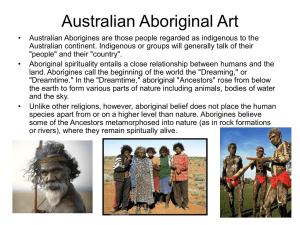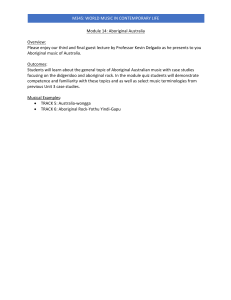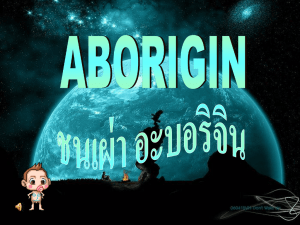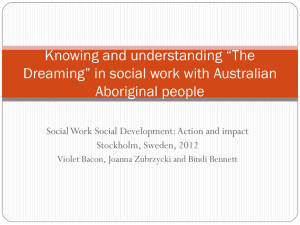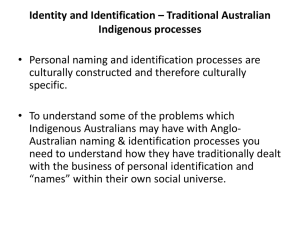Uploaded by
bellathesurfer1
Stolen Generation Impact: Personal & Professional Reflection
advertisement
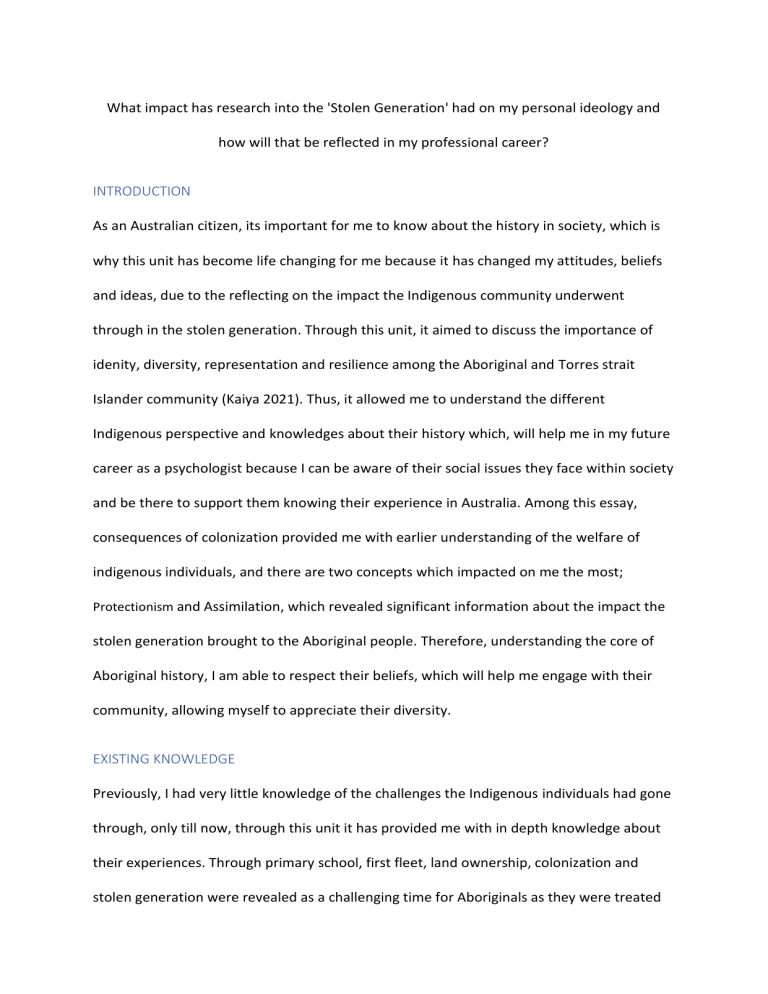
What impact has research into the 'Stolen Generation' had on my personal ideology and how will that be reflected in my professional career? INTRODUCTION As an Australian citizen, its important for me to know about the history in society, which is why this unit has become life changing for me because it has changed my attitudes, beliefs and ideas, due to the reflecting on the impact the Indigenous community underwent through in the stolen generation. Through this unit, it aimed to discuss the importance of idenity, diversity, representation and resilience among the Aboriginal and Torres strait Islander community (Kaiya 2021). Thus, it allowed me to understand the different Indigenous perspective and knowledges about their history which, will help me in my future career as a psychologist because I can be aware of their social issues they face within society and be there to support them knowing their experience in Australia. Among this essay, consequences of colonization provided me with earlier understanding of the welfare of indigenous individuals, and there are two concepts which impacted on me the most; Protectionism and Assimilation, which revealed significant information about the impact the stolen generation brought to the Aboriginal people. Therefore, understanding the core of Aboriginal history, I am able to respect their beliefs, which will help me engage with their community, allowing myself to appreciate their diversity. EXISTING KNOWLEDGE Previously, I had very little knowledge of the challenges the Indigenous individuals had gone through, only till now, through this unit it has provided me with in depth knowledge about their experiences. Through primary school, first fleet, land ownership, colonization and stolen generation were revealed as a challenging time for Aboriginals as they were treated unequally. However, the knowing of this history did not continue through high school, it was only through word of mouth or media that provided the knowledge about Aboriginal communities. Thus, this had impacted me a lot during this unit because I was unaware and disappointed because I didn’t know the other side of the Australian history. Therefore, acknowledging and recognizing the history, will change me mentally because I will uncover the truths about their past. CONSEQUENCES OF COLONIZATION The concept of colonization was introduced to me at the beginning of the course in week 2, in order to understand the political control Australians had over Indigenous population. However, my understanding of colonization was very limited, because through primary school, little information was taught about Indigenous people which made me not understand the severity brought to the Aboriginal community. Thus, when it came to Tutorial two and exploring different ideas about this concept with each other, I did not have any knowledge and this made me feel ashamed because I wasn’t aware of the Australian history. The definition being provided to me of colonization ‘the action or process of settling among and establishing control over the Indigenous people of an area’, benefited me because I now had an idea of the concept. Although, there was a question that arose on me asking why is it necessary to understand this information still? Colonization brought trade of goods for the land and people, and in today society it is not seen to be impacting on Aboriginals in contrast to what it was before. However, this was based on my idea and it was obvious that I was naive on this concept as I did not have the knowledge about the Aboriginal community. Though, through the learning of this concept, I now have an understanding about the impact and long-term effect of colonization. Human rights and Equal Opportunity commission (2003) reported, Indigenous children had been forcibly separated from their families and exploited for their labor since the very first day of European occupation of Australia, and faced violent battles over rights to land, food and water resources. Hence, through this contact I am able to recognize the tragic experience of those who suffered upon this time. Furthermore, Schaffer (2002), highlights how the stolen generation created international media attention due to the revealing of Australia’s shameful past and its growing reputation for human right violations. As well Schaffer (p.6) reveals the Human rights and Equal Opportunity commission (2003) report brings ‘legitimacy and acknowledgment to the stories, loss of family, kinship, land and country and the ongoing effect of loss’, which provides awareness to non-indigenous citizens. Therefore, through the consequences of colonization, this unit had made me aware of the situation in which the Indigenous community experienced through. ROTECTIONISM AND ASSIMILATION Understanding the concept of Protectionism and Assimilation is important in order to understand the phases of colonialism, thus, this was introduced in week 6 and 8 tutorials, which provided awareness among the level of protection the Indigenous community received in Australia. Protection was proposed through the Aboriginal Protection Act (1869) in order to control the injustice acts of cruelty, oppression and encroachment on their property. However, among this act, it gave power to the board to move Aboriginal people out of towns and control reserves. Thus, this created impact on the Aboriginal Idenity, due to the force removal from traditional lands and cultural practices in which they loss the spiritual and physical connection. Among this knowledge, the view I had about Aboriginal protection had changed significantly, because it revealed to me Aboriginal people do not receive the same protection Australian individuals receive, which is unfair because the level of equality should be balanced in society (Australian Government: Australian Law Reform Commission 2010). Thus, understanding this had made me feel upset because Aboriginal people should be recognised equally in the eyes of the government. Furthermore, learning about the concept of Assimilation in society, Aboriginal people were expected to become equal citizens with the same rights and privileges individuals have in Australia. Through, this concept it was able to reveal to me how assimilation caused many obstacles for the Aboriginal community as they had to give up their rights of land, culture practice and language which created a loss of idenity for them. Also, the stolen generation was the main feature of the assimilation era which caused many Indigenous families to mourn the removal of their children as they were being assimilated into white society (Kaiya 2021). Bronwyn (2016) stated ‘Aboriginals who resisted assimilation were faced with discrimination and viewed as an Aboriginal by self-image’. So, among this, Cressida, Lawrence, Ray, Scott, and Bill (2013, p.1 64) reveal ‘knowledge is put to work through certain technologies, historical context and specific institutions’, which highlights how from this unit and engaging with my peers and my tutors it has provided me with immense information about how their idenity was challenged among the era of the stolen generation. Therefore, both these concepts have changed my attitude and beliefs because I can now be aware of the control, the Australian society had upon an Aboriginal idenity. DEVELOPED KNOWLEDGE UPON MY IDELOGY Understanding the Aboriginal history, throughout this unit has provided me with immense knowledge, compared to the existing knowledge I had before. Thus, this is very important for myself and my career because as this past is very complex, it allows me to become aware of the feelings and behaviours the Indigenous people indured through. The content provided are not just facts, it’s the way of knowing about the Indigenous nation, which allows me to respect and rightfully recognise the first nations on this land, in which have been told by the visitors of this country. Additionally, I have become more sensitive to this topic, because I have felt the pain and put myself in their situation, which made me feel connected to their history of their land and kinship. Thus, this is important for my carer as a psychologist because illustrated by Pat, Debra, Darren and Heather (2014) you must be aware of one’s history when identifying their emotions, which is why having knowledge of the impact of the trauma of those children who were forcible removed, I will able to support and encourage them to overcome their generational suffering. Therefore, this unit has influenced me significantly because I am aware of the true stories in the Indigenous History. CONCLUSION In conclusion, learning about the consequences of colonisation and the concepts of Protectionism and Assimilation, it has brought me in depth knowledge about the impacts of stolen generation. However, among my career I would like to organise more support groups for Aboriginal individuals as them seems to be discrimination among their race in which they are being rejected from support groups (Pat, Debra, Darren, and Heather 2014). Thus, this is important because we all need to share a voice and helping one another reflects upon our values and ethics as an individual. Therefore, this unit has been a positive influence on me as I have been able to reflect upon the challenges the Aboriginal community have been through in the stolen generation, which is significant in Australian history. REFERENCE LIST Human rights and Equal Opportunity commission 2003, Bringing them home learning about the National Inquiry into the separation of Aboriginal and Torres Strait Islander children from their Families, viewed 27th September 2021, https://bth.humanrights.gov.au/sites/default/files/documents/bringing_them_home_repor t.pdf Australian Government: Australian Law Reform Commission 2010, Changing policies towards Aboriginal people, viewed 27th September 2021, https://www.alrc.gov.au/publication/recognition-of-aboriginal-customary-laws-alrc-report31/3-aboriginal-societies-the-experience-of-contact/changing-policies-towards-aboriginalpeople/ Bronwyn, B 2016, The Politics of Idenity: who counts as Aboriginal today?, AIATSIS, Canberra. Cressida, F, Lawrence, B, Ray, L, Scott, G, & Bill, F 2013, ‘Discourse, deficit and identity:Aboriginality, the race paradigm and the language of representation in contemporary Australia’, Media international Australia incorporating Culture & policy, vol.149, no.149, pp.163-164, viewed 27th September 2021, Academic Search Complete database, 10.1177/1329878X1314900117 Pat, D, Debra, R, Darren, G, Heather, G 2014, ‘Working Together:Aboriginal and Torres Strait Islander Mental Health and Well-being Principles and Practice, Kulunga Research Network , Melbourne. Karen, M & Booran, M 2003, ‘Ways of knowing, being and doing: A theoretical framework and methods for indigenous and indigenist re-search’, Journal of Australian studies, vol.27, no.76, pp.209-211, viewed 29th September 2021, Academic Search Complete database, 10.1080/14443050309387838 Schaffer, K 2002, ‘Stolen Generation Narratives in Local and Global Contexts’, American Association of Australian Literary Studies, vol. 16, no.1, pp. 5-6
